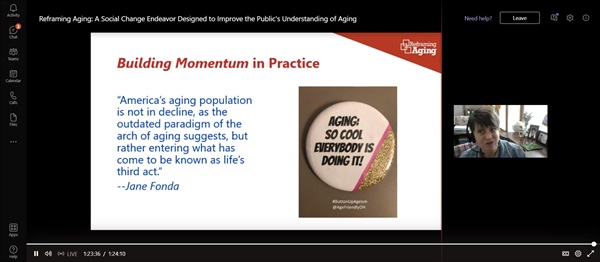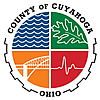DSAS Helps Change Aging Narrative with 'Reframing Aging' Workshop

The Cuyahoga County Division of Senior and Adult Services (DSAS) launched a new narrative around the topic of aging with its recent “Reframing Aging” workshop. The session was facilitated by state aging expert, Beth Kowalczyk, Chief Policy Officer for the Ohio Association of Area Agencies on Aging. Kowalczyk is part of a national group of facilitators trained in the Reframing Aging concept by the Gerontological Society of America.
“Research found that the public’s perception of aging is decidedly negative and antithetical to how most older people feel and what experts in the field know to be true," said Tracey N. Mason, DSAS Administrator. "We’re looking to counter ageism by changing how we talk about aging on a county-wide level. With new understanding from this workshop, our shared goal is to increase our collective awareness, so we can guide our approach to healthy aging through supportive policies, programs and community dialogue.”
Mason noted that while DSAS has made some strides, there’s still a lot more to do. DSAS is committed to:
• Exposing staff and the public to new ways of thinking about aging (which prompted this workshop)
• Committing to bias free language
• Rethinking our policies and support systems
• Developing and promoting positive ways to discuss aging
• Researching new programs and services to support those we serve
In the workshop, Kowalczyk explained the concept of ageism, which can be external, internal, explicit or implicit. She offered birthday cards as an explicit example. One card shared the following message, meant to be humorous, “What could be better than getting older? Almost anything.” When viewed through an ageism lens, the humor notably falls flat, and borders on derogatory.
“These messages are awful,” she asserted. “They make older people feel debilitated, unworthy of attention, extricated from society. There’s nothing humorous about this.”
She shared statistics from a recent University of Michigan poll on ageism, which found that one’s attitude towards aging can impact lifespan in a positive or negative fashion. The poll indicated that older people who experienced ageist messaging felt unattractive, depressed, more likely to suffer functional decline or heart failure, and had a decreased lifespan of seven years. Conversely, those with a positive perception of aging felt more comfortable being themselves, had a strong sense of purpose, felt more positive about aging, thought their life was better than anticipated, and enjoyed a 7.5 year increase to their lifespan.
“How we talk about aging is important,” Kowalczyk explained. “Framing is about choices we make in communication -- what we emphasize, what we explain, what we leave unsaid.” She described this as a ‘You say / they think’ mentality. “We think we are putting out messages that sound reasonable, but when shared with the public, elicit a different response.”
She also talked about the importance of cultural patterns of thinking around aging. “Our minds are not empty fishbowls. Instead, there are cultural models and patterns of thinking that help us interpret messages.”
Kowalczyk explained that our brain is akin to a ‘swamp,’ where both fruitful and harmful notions of aging exist, like orchids and alligators. The key is to recognize the difference and “feed the orchids, not the alligators.”
Some examples of ‘alligators’ in the mental swamp of aging include:
- Ideal and Perceived Realities (if you make all the right decisions, you win)
- Us vs. Them Mentalities (older vs. “other”)
- Individualism (one’s outcome is based solely on one’s life choices)
- Fatalistic Attitudes (aging as a natural disaster)
- Nostalgia and the Threat of Modernity (life used to be better when …)
Kowalczyk shared her thoughts on solutions to address the challenge of ageism -- which she referred to as ‘orchids.’ “Let’s address what we can at a higher level, through policy and systemic changes, instead of putting everything on the shoulders of older adults. Positive messaging, collective responsibility and a belief that problems can be solved help us overcome the ‘alligator’ messages,” she noted.
Some concrete examples of these ‘orchid’ solutions include:
- Avoiding stories that lead with demographic shifts (the ‘tsunami’ story)
- Incorporating ‘we’ language.Instead of saying 'what older people need,’ shift the conversation to ‘what we need as we grow older.’
- Replacing terms that further a sense of ‘othering.’Instead of ‘senior’ or ‘elder,’ try inclusive choices like ‘older people,’ ‘older adults,’ or ‘older Ohioans.’
- Becoming invested in the process of aging. We are all aging. It’s time to get invested in what we are talking about.
- Switching from “old think” to “new think.” We can change the ageism narrative with messages and imagery that use the metaphor of ‘building momentum’ in our communications.
Kowalczyk said the key is to recognize the dominant patterns of thinking that can get in the way of having a more productive and positive understanding of aging, call out ageism when we experience it, and provide positive redirection from ageist thoughts and messages.
In closing, she invited us to learn more on the reframing discussion by visiting the Reframing Aging website, where there is a downloadable toolkit, a monthly newsletter, ‘Caravan’ and an implicit bias test developed by researchers at Harvard University.
To learn more about the Division of Senior and Adult Services and our programs for older adults and adults with disabilities, visit dsas.cuyahogacounty.us or call 216-420-6700.

